Have you ever followed a recipe “to a T” only to have it end up a complete disaster? Yeah, you’re not alone. It’s happened to all of us… maybe even multiple times. ;) No matter how clearly a recipe is written, there will always be variables that can’t be accounted for and plenty of room for error. But don’t let that scare you! Cooking is a skill that must be learned and honed over time. That’s why we’re not all cooking like Julia Child after following our first recipe. After spending years troubleshooting recipes and answering questions from new cooks, I’ve compiled these 10 Tips for Recipe Success to help you navigate the unknown and hopefully prevent recipe disasters as you build your skills.
But if you do have a recipe disaster, learn from the experience! I like to think of recipe disasters a little like bad relationships. They may have felt like a total waste of your time and energy, but you’re bound to have learned something valuable along the way. ;)
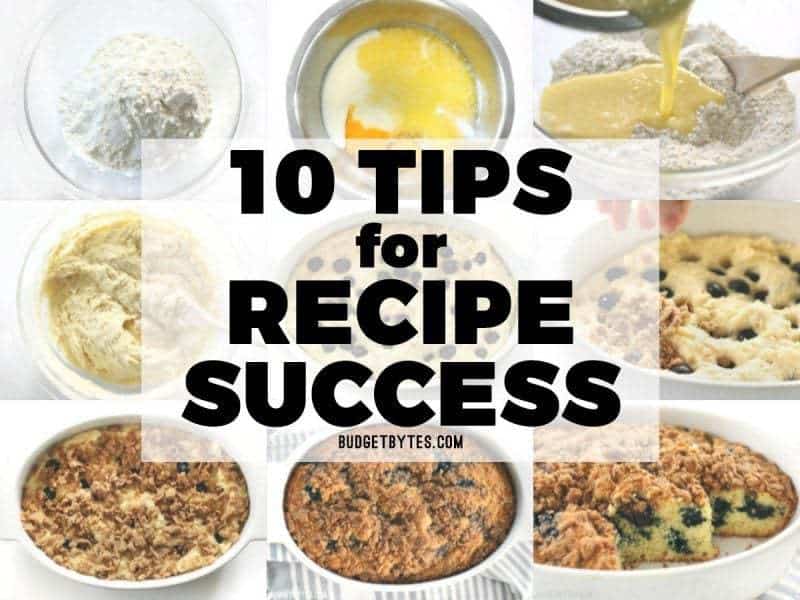
All recipes are rigorously tested in our Nashville Test Kitchen to ensure they are easy, affordable, and delicious.
1. Read the Recipes from Beginning to End Before you Begin
Even if it’s a recipe you’ve cooked 10 times before, read through the entire recipe before beginning. This is probably the most overlooked step and one that even I admit to forgetting from time to time (and it ALWAYS ends up in an “oh crap!” moment). Giving a recipe a quick read-through helps prevent surprises, forgotten ingredients, and can help you form a mental game plan of how you’ll execute the recipe. On my site, I also suggest browsing through the step by step photos before beginning to cook, for an extra bit of disaster insurance.
2. Google Unfamiliar Words
We’re so lucky to have the internet and all of its information at our fingertips! If you come across a word in a recipe that you’re unfamiliar with, take a second to look it up. If it’s a cooking technique, chances are you’ll probably even be able to find a short tutorial video showing you exactly how it’s done and that’s like having a free, on the spot cooking class!
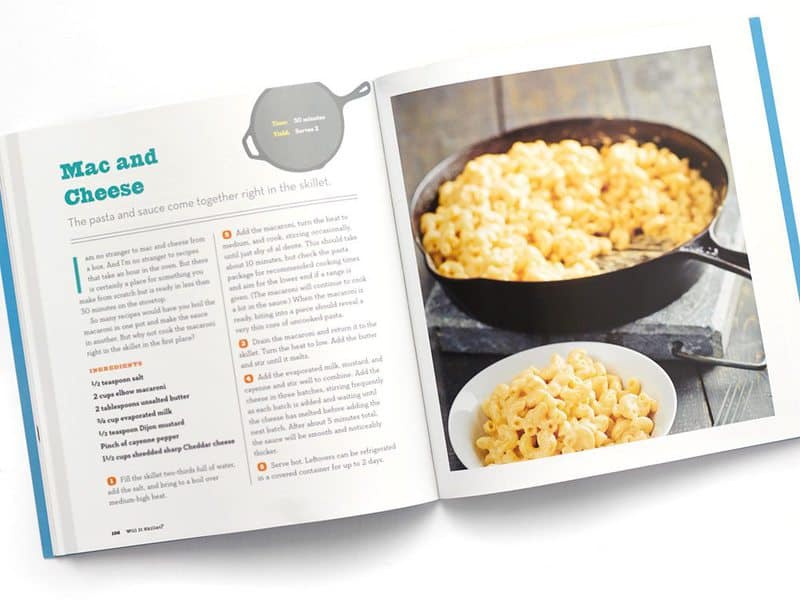
3. Pay Attention to How Ingredients are Listed
One thing that often trips people up is the term “divided,” as in “1/2 cup chopped nuts, divided.” When you see “divided” listed after an ingredient, this means the amount listed is the total amount used in the recipe, but you’ll use a portion of that amount in one step, and the rest later on. You can find out how much to use and when by reading the instructions (see tip #1!). For instance, with the chopped nuts example, the recipe may require you to stir 1/4 cup of the chopped nuts into a muffin batter and use the remaining 1/4 cup to sprinkle on top later. Another important designation is the placement of words like “chopped” or “diced.” If an ingredient is listed as “1 cup chopped walnuts” that means you measure one cup of nuts that are already chopped. If it is listed as “1 cup walnuts, chopped” this means that you measure 1 cup of whole walnuts, then chop them after measuring.
4. Read Reviews First
Almost every recipe website and blog has reviews, which can be extremely helpful. Always take reviews with a grain of salt, but look for trends like “this turned out too dry” or “I had to bake for an extra 15 minutes” so you can know which parts of the recipe to approach with caution, or decide if a recipe is too risky all together. I especially encourage this with blog recipes, which may not get the same rigorous testing as recipes from major food magazines or cookbooks. You don’t need to read them all, but at least browse through a few to get a feel for how the recipe performs “in the real world.”
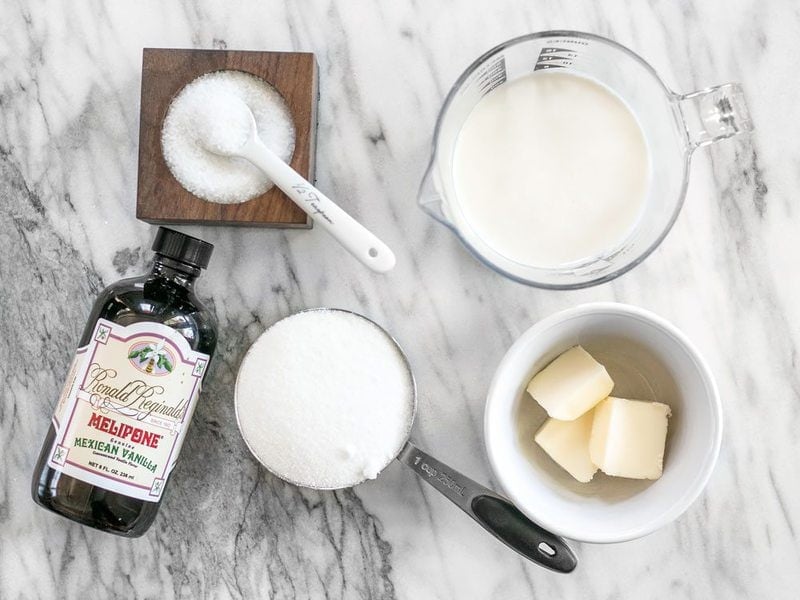
5. Prep Before you Cook
When you’re first learning to cook, it can be helpful to use a technique called “mise en place.” This French phrase simply means to gather all your ingredients and have them prepared (measured, peeled, diced, chopped, etc.) before you begin cooking. This method can take longer than prepping as you cook, but its a great way to make sure no details are missed and it can greatly reduce the stress of multi-tasking. With all your ingredients prepared ahead of time, all of your attention can stay on the hot food in the skillet/pot/oven as you cook so you can avoid burning, boiling over, or any other hiccup.
6. Start Small
If you’re new to cooking, try something simple first and work your way up. Don’t shoot for the stars on your first go. As I mentioned before, the process of cooking is full of all sorts of nuances and requires a great deal of intuition that you have to learn and build over time. If all you know how to do is boil water, start with a simple pasta dish. Try not to choose a recipe that has multiple techniques and ingredients that you’ve never used before. Try one new technique or ingredient at a time.
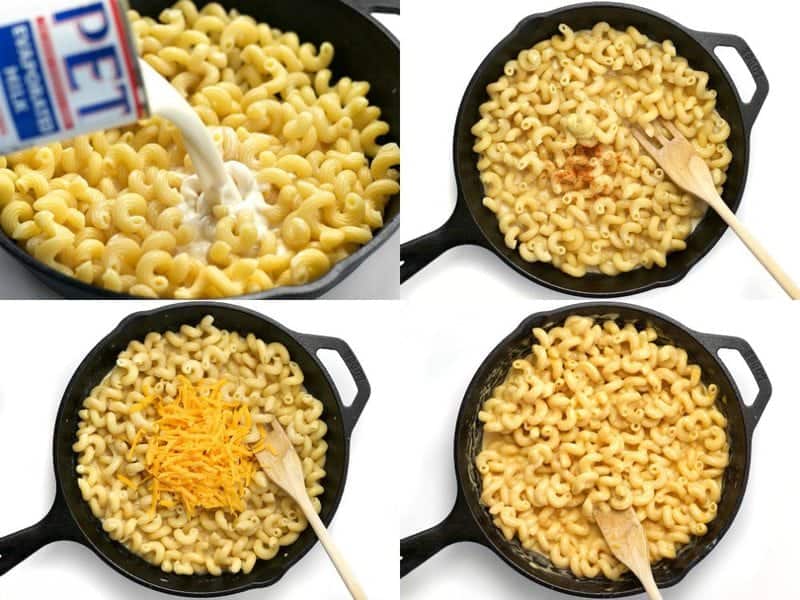
7. Test Recipes Before Special Occasions
There are an infinite number of variables involved with cooking and you want to avoid surprises, so it’s always good to give recipes a test run before big occasions or cooking for guests. It’s not unusual for a recipe to need slight tweaking for your unique mix of equipment and ingredients. Plus, you may just find that you don’t like a recipe as much as you expected from its description! :)
8. Use All Your Senses
Most recipes suggest cooking times and temperatures for each step, but it’s always wise to use your senses to tell you whether you need to increase heat, decrease heat, or move on to the next step. If a recipe says to sauté for five minutes, but you see and smell it beginning to burn sooner, STOP. Remove it from the heat and reassess the situation. I try to include sensory cues in my instructions when possible, to help you build your cooking intuition. A good example of sensory cues is when you toast rice in a skillet with a little bit of oil or butter, you’ll begin to smell a nutty aroma, the individual grains will begin to look translucent, and you’ll even hear a popping or crackling noise. I could simply tell you to toast the rice in a skillet with oil for 5 minutes, but if your range top runs hotter than mine or your cookware is thinner, this can change the timing. I can tell you to boil potatoes for ten minutes, but the only way to truly know they’re done is to test the texture by piercing them with a fork. Using your senses helps you really understand what is happening as you cook, and will build your intuition.
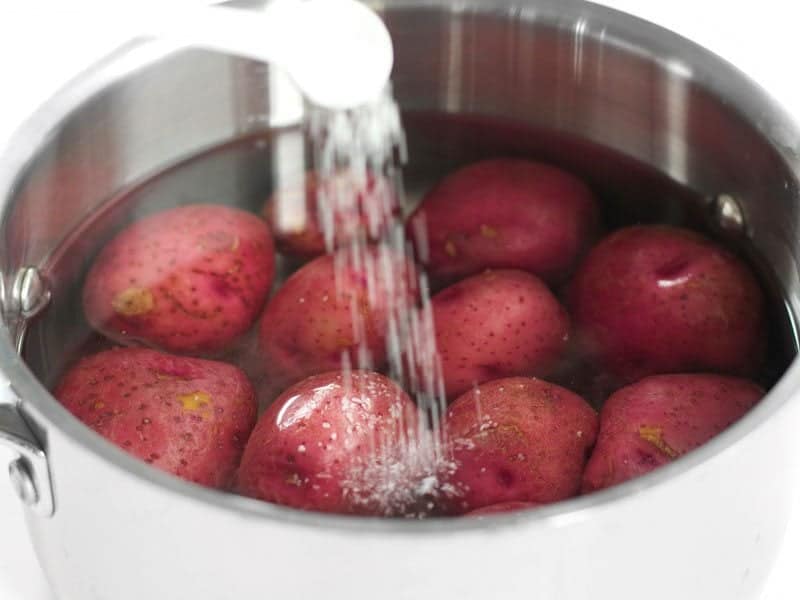
9. Taste As You Go
Speaking of using your senses, it’s very important to taste as you go. The one thing that varies the most in the cooking process is the taste buds of the individual, sensitivity to salt in particular. Try to taste the food as you go (avoiding raw meat and eggs) to make sure the food is seasoned to your palate. Tasting as you go will also help you learn how the flavor of herbs and spices change throughout the cooking process, allowing you to understand how and when to add them to customize recipes in the future.
10. Experiment With Caution
Every time you swap out an ingredient, no matter how small, it will change the flavor, texture, or both of the final recipe. Make sure you’re familiar with a recipe or cooking technique before you attempt to substitute ingredients. Read through those reviews to see if anyone else has already attempted the same substitution. Be aware that changing ingredients may also change the time or temperature needed to cook the dish. Making a recipe your own is a wonderful thing and I fully support customizing recipes to fit your needs, but make sure you do it with caution and with the knowledge that the outcome will be different from the original.
What are your favorite cautionary tips that you’d share with a new cook? Or something you’d tell yourself if you could go back in time to your first recipe? Share your wisdom in the comments below!


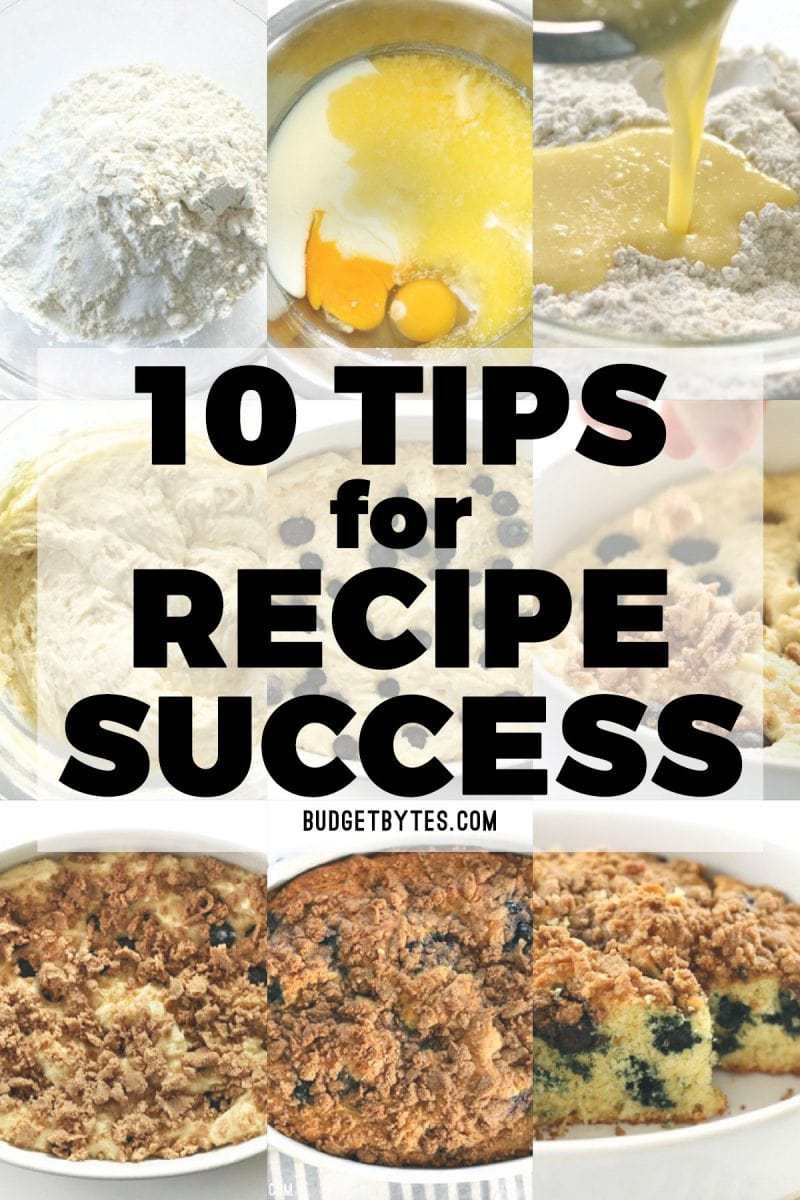
New bakers are afraid to try to bake.
They may live alone, nobody is watching what they do.
I tell them. Nobody saw that it didn’t work.
Toss the disaster and try again.
There are no witnesses to your mistakes.
Read the ten hints above
Stay calm
And try it again.
Always read the recipe
Get all ingredients out before you start
If for any reason you dont have an ingredient google “ what is a substitute for” and select one that fits in the context of the recipe
Be careful when you use the number of servings converters that are on some blogs. Especially for salt. If the printed recipe is for 2 servings and you want to go to eight servings you will probably ruin your food with four times as much salt.
When I was teaching my kids to cook, I have them go to the pantry and gather all of the ingredients in a flat box. Next I have them measure and prep and put each bowl on a sheet pan. Then they are able to start the cooking process and it is easier for them to see if they have added everything. I will say that these kids can now feed themselves and others.
My favorite story is I was at work and I usually made our Fourth of July Greek pasta salad and vegetarian baked beans the day before. We usually make about 20 servings of each dish. I was not looking forward to doing all of that after work. My granddaughter called me and said that she had made both of them. They were both perfect. I am so glad that she always helped me cook. She can do all of the secret family recipes to perfection now.
I think I shall employ this mise en place concept, as I am usually grabbing things as I go and my food in the pan is starting to overcook before I’ve finished chopping or prepping for the next step… Ev-er-y-time!!! I think I see the need for having to dirty up a lot of bowls or things to hold the prepped ingredients, and as someone without a dishwasher, that sounds extremely unappealing to me. But maybe just one larger platter can hold each item in a little pile. I’ll try that next time. Thanks for these tips! Very helpful!
Same, SK! Every time!! I personally include the gathering of equipment and kitchen tools I will need for a recipe into my “mis en place” routine — in addition to just preparing the ingredients and reading through the recipe before I begin cooking. If I have an idea of what I will need and put it all within arms reach, it seriously reduces the number of extra dishes I grab for this or that. I usually try to keep it to 1-2 bowls (combining ingredients that will be added together in the same bowl or reusing the same one at different steps) and love to use some little souffle cups I have for things like minced garlic or chopped herbs. You could also use the containers you’re going to store leftovers in later! ~Marion :)
It ALWAYS takes me longer to complete a dish than the recipes’ listed time estimates. I am considering doubling prep time for most recipes – especially when trying for the first time
Loved all these tips…wish I’d seen them decades ago when I was learning how to cook (teaching myself).
There is one issue that wasn’t covered and it’s a pet peeve of mine-from chefs and ‘recipe writers’.. Unmeasured ingredients as in, “!/4 onion, diced” or “1/4 chopped onion”. Now I buy #1’s at Walmart for 89 cents each and they are 3/4 of a pound or more. when my wife shops she buys small onions (in a net bag) that are 1/4 pound each. The same problem occurs with other aromatics like Bell Peppers, Celery and garlic.
I’ve sorted this out over years so I know what works and what we like, but it would be really great if some super smart chef (oh I don’t know-maybe someone from Nashville, TN?)
were to write up something for new cooks on some rules of thumb to help the beginners. Just sayin’.
Husband waited 30 years to tell me that he didn’t like corn in hamburger soup!
List all recipes and what cookbook they’re in. Or, name of cookbook and list the recipes & page numbers. Or, in the index of the cookbook highlight the recipes you like. Or, like me do all 3.
I accept that I’m slower than most doing recipe prep, but who can peal & slice 10 potatoes, 5 onions & slice 2 kielbasa sausages in 15 minutes? I ignore all prep times.
I do write OK, good or very good on the recipes. Then just cross out the ones husband doesn’t like.
Definately, list what changes I make.
great list! great reminders! Thank you.
Write the date on every recipe you try for the 1st time.
Stole that one from my mother, and there is nothing more powerful than running your fingers over ink and knowing you’ve been doing this same burger recipe for 10 years.
Regarding tip #9, you say to avoid tasting raw meat or eggs. There’s a way around this. For ground meat, make a small patty (about an inch or so) and cook it. Then you can taste it to see if you need to adjust seasonings for meatballs, burgers, or meat loaf. If you have chopped meat, same thing. Just cook a piece or two for tasting. It only takes a few minutes out of your time.
Smart idea.
In manufacturing in the aerospace industry we call this a “witness sample”. :)
My tip for trying something new is to take notes. I have serval recipes printed out just so I can use the back side for things I’ve tried that people liked or hated. I got good at trying new things but forgetting what changes I made. Once I started to write down the changes it helped me out a lot.
Great tips Tiffany!
“Another important designation is the placement of words like “chopped” or “diced.” If an ingredient is listed as “1 cup chopped walnuts” that means you measure one cup of nuts that are already chopped. If it is listed as “1 cup walnuts, chopped” this means that you measure 1 cup of whole walnuts, then chop them after measuring.”
I have been cooking for 13 years and have always wondered this!!! Thank you so much! You don’t even know how excited I am haha.
You’re so right!
Ditto!
The same thing goes for “sifted flour” vs. “flour, sifted.”
The flour one can make a huge difference! My great grandmother had a cookie recipe that was passed down without being written down. I was taught 4 cups flour, sifted. But the recipe was always temperamental. Adding extra liquid was essential, but how much worked was hard to judge. Then at some point it dawned on me to try 4 cups sifted flour. Bam! No need for extra liquid, and perfect cookies every time, since.
The same thing goes with “melted’. ie “1 cup butter, melted” or ”1 cup melted butter” Great site!
yes! Isn’t it amazing to learn something – I have been cooking for 50 + years…. I think I kind of knew this, but…. didn’t “KNOW” this. will be so helpful as I have one son moving home (22 years old) who is keener to learn more about cooking after a few years of University living…He will be miles ahead of me in reading recipes.
Thank you for such an informative food blog. While there are literally hundreds, if not more, food blogs out there, I do have to say I find yours to be so informative and on a level that every level of cook can understood and glean knowledge from. Your recipes I have tried so far are all ones I would keep in my “Definitely make again” list. I really appreciate the tips you give and have found that each one I find something in it that aids me in the kitchen.
Thank you and keep up the good work and great cooking!
Thank you Cherylynn!
Hello from the UK
We hve been metric for 20 years now. Although I was educated in the imperial system, I can only think metric now. Is it possible to include metric alongside you imperial system? Many thanks
Yes! I’m from Canada and it’s the same here. I can always ask Siri to translate, but I would love to save that step!
We get feedback about including metric units a lot, but unfortunately haven’t found a good solution for it yet. There are a lot of plugins and apps that already do automatic conversion (the recipe card that we use actually has that functionality), but while it sounds great in theory, it rarely works well in practice. There are many issues that prevent it from working properly, one of the main reasons being that often you need to not only convert from imperial to metric, but you also need to convert from volume to weight, which requires knowing the density of that particular ingredient. Other big issues include inconsistent ingredient formatting, the fact that we use both weight and volume ounces, and ingredients that contain both solid and liquid material, but the containers only list the “dry” weight. We’ve explored the issue a lot and I just don’t feel comfortable offering metric units unless I can manually remeasure and test each recipe with those units. Right now that’s not feasible, BUT hopefully in the future, when I have a full team, that’s a project we can put on the list. :)
Not sure how this could be treated but I have found more than once errors in a recipe. For example, a recipe for crock-pot potato soup called for eight pounds of potatoes. Yes, I bought them and brought them home. Regarded my crock pot and took a good look at the potatoes waiting to be peeled and opined, “Forget it!” Googled similar recipes and decided that was one recipe that I did not want to try. More than one recipe would advise in the “directions” to add a required item. But, nowhere in the list of ingredients was that item mentioned or its amount! So, my advice to the good folk sharing their recipes on their web sites to double check and/or proof read their recipe to save us a recipe disaster. Thank you for asking. :>)